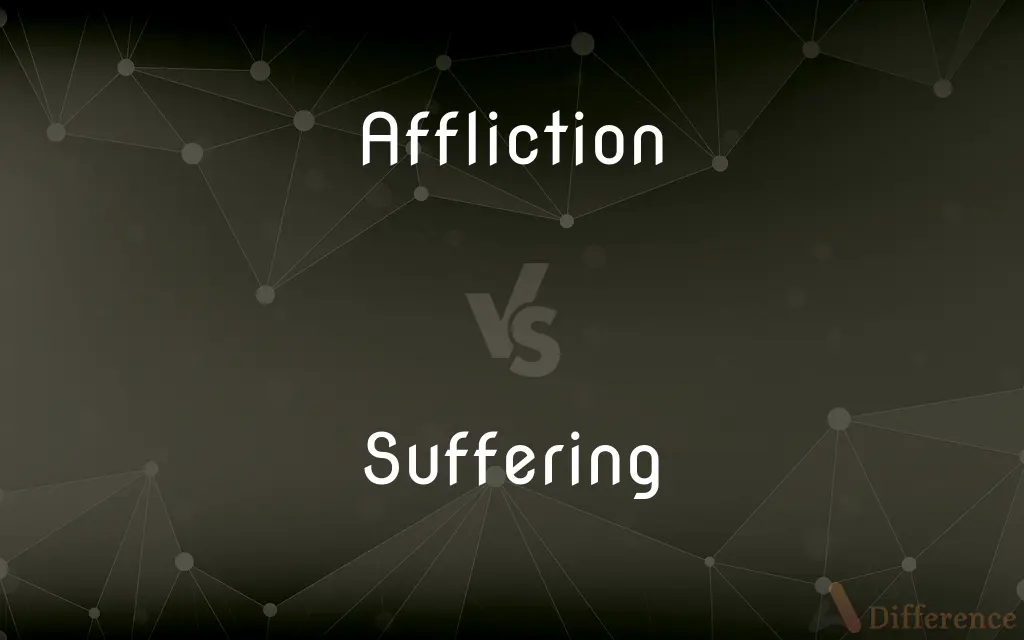Affliction vs. Suffering — What's the Difference?
By Maham Liaqat & Urooj Arif — Updated on March 29, 2024
Affliction refers to a state of pain, distress, or hardship caused by illness or misfortune, while suffering encompasses the broad experience of pain, distress, or hardship, whether physical, emotional, or psychological.

Difference Between Affliction and Suffering
Table of Contents
ADVERTISEMENT
Key Differences
Affliction often implies a specific cause or source of distress, such as a disease, condition, or unfortunate circumstance. It suggests a more external origin, highlighting the afflictive nature of the situation or condition impacting an individual. For example, chronic illnesses or natural disasters are types of afflictions that can lead to long-term distress. Suffering, on the other hand, is a more encompassing term that refers to the experience of pain or distress itself, regardless of its source. It can be the result of affliction but also includes emotional and psychological dimensions, such as grief or depression, that may not have a singular external cause.
Affliction is sometimes used to denote a condition that is imposed upon someone, often implying a trial or challenge that one must endure. This term can carry a connotation of testing or purification through hardship. In contrast, suffering is more neutral, focusing on the state of experiencing pain without necessarily implying a test or a challenge. It simply acknowledges the presence of pain in one's life, whether it comes from an identifiable affliction or from more complex, multifaceted sources.
In religious or spiritual contexts, affliction may be viewed as a test of faith or character, given or allowed by a higher power for a specific purpose, such as spiritual growth or discipline. Suffering, while also significant in these contexts, is often discussed in terms of its existential aspects and how individuals cope with or find meaning in their pain, regardless of its specific nature or origin.
The societal and medical responses to affliction and suffering can differ. Affliction, especially when it is related to physical health, often prompts a response aimed at treating or alleviating the specific cause of distress. Medical professionals, for example, may seek to address an affliction with targeted therapies or interventions. Suffering, due to its broader and sometimes more subjective nature, requires a more holistic approach, often involving psychological support, counseling, and sometimes spiritual care, addressing the individual's overall experience of pain and distress.
While both affliction and suffering are associated with negative experiences, the ways in which people respond to and cope with them can vary widely. Affliction, being potentially more tangible, might be approached with direct actions aimed at removing or easing the source of distress. Suffering, encompassing a wider range of experiences, might be navigated through emotional support, personal resilience, and seeking meaning or solace in the experience.
ADVERTISEMENT
Comparison Chart
Definition
A state of distress caused by illness or misfortune
The experience of pain, distress, or hardship
Origin
Often external, specific causes
Broad, including physical, emotional, and psychological pain
Context
Can imply a test or challenge
Focuses on the experience of pain itself
Response
Targeted treatment or alleviation
Holistic approach, including psychological and spiritual care
In Religious Context
Viewed as a test of faith or character
Discussed in terms of existential aspects and coping
Compare with Definitions
Affliction
Misfortune or hardship experienced.
The community faced the affliction of a devastating hurricane.
Suffering
The state of undergoing pain, distress, or hardship.
She spoke eloquently on the human condition of suffering.
Affliction
A trial or challenge that tests one's endurance.
The athlete saw his injury as an affliction to overcome.
Suffering
Enduring adverse conditions or feelings.
Refugees endure suffering in search of a safer existence.
Affliction
A condition of suffering or distress due to ill health.
Rheumatoid arthritis is an affliction that impacts millions globally.
Suffering
Emotional or psychological pain.
The loss of a loved one is a profound source of suffering.
Affliction
Something that causes pain or suffering.
Poverty is an affliction affecting diverse populations around the world.
Suffering
The experience of physical discomfort.
Patients seek relief from the suffering caused by chronic diseases.
Affliction
A source of ongoing distress.
Chronic back pain is an affliction that disrupts daily activities.
Suffering
The process of coping with distressing experiences.
Finding meaning in suffering can lead to personal growth.
Affliction
A cause of pain or harm
A crippling affliction of the nervous system
Suffering
Suffering, or pain in a broad sense, may be an experience of unpleasantness and aversion associated with the perception of harm or threat of harm in an individual. Suffering is the basic element that makes up the negative valence of affective phenomena.
Affliction
A condition of pain, suffering, or distress
The affliction of arthritis.
Suffering
The state of undergoing pain, distress, or hardship
Weapons that cause unnecessary suffering
His disregard for the sufferings of his fellow countrymen
Affliction
A cause of pain, suffering, or distress
"The mount twists wind and weather to alter them into afflictions as a heartless monarch does laws" (William Least Heat-Moon).
Suffering
The condition of one who suffers; the bearing of pain or distress.
Affliction
A state of pain, suffering, distress or agony.
Suffering
An instance of pain or distress.
Affliction
Something which causes pain, suffering, distress or agony.
Suffering
Experiencing pain; characterized by suffering.
Affliction
The cause of continued pain of body or mind, as sickness, losses, etc.; an instance of grievous distress; a pain or grief.
To repay that money will be a biting affliction.
Suffering
The condition of someone who suffers; a state of pain or distress.
Affliction
The state of being afflicted; a state of pain, distress, or grief.
Some virtues are seen only in affliction.
Suffering
Present participle of suffer
Affliction
A state of great suffering and distress due to adversity
Suffering
The bearing of pain, inconvenience, or loss; pain endured; distress, loss, or injury incurred; as, sufferings by pain or sorrow; sufferings by want or by wrongs.
Affliction
A condition of suffering or distress due to ill health
Suffering
Being in pain or grief; having loss, injury, distress, etc.
Affliction
A cause of great suffering and distress
Suffering
A state of acute pain
Suffering
Misery resulting from affliction
Suffering
Psychological suffering;
The death of his wife caused him great distress
Suffering
Feelings of mental or physical pain
Suffering
Troubled by pain or loss;
Suffering refugees
Suffering
Very unhappy; full of misery;
He felt depressed and miserable
A message of hope for suffering humanity
Wretched prisoners huddled in stinking cages
Common Curiosities
Is it possible to experience suffering without a specific affliction?
Yes, suffering can arise from emotional or psychological distress without a singular, identifiable cause.
How can afflictions be alleviated?
Afflictions, especially those related to health, can often be alleviated through medical treatment, lifestyle changes, or interventions designed to address the specific cause.
How do societies respond to affliction and suffering?
Societal responses can include medical care, support systems, counseling services, and community solidarity to help alleviate the causes of affliction and the broader experience of suffering.
Can the impact of affliction and suffering be minimized?
Through support, treatment, and personal coping strategies, the impact of affliction and suffering can often be managed or reduced, though this can vary greatly depending on the individual and the context.
Are affliction and suffering always negative experiences?
While both are challenging and often painful, individuals and cultures may find ways to derive meaning, growth, or a sense of achievement from overcoming afflictions and navigating suffering.
How is suffering communicated in art and literature?
Art and literature often explore themes of suffering, using them to reflect on the human condition, evoke empathy, and sometimes offer insights into coping with life's challenges.
Can affliction lead to suffering?
Yes, affliction often leads to suffering by causing distress or hardship that affects an individual's well-being.
Can suffering have positive aspects?
While inherently challenging, some individuals find that navigating through suffering can lead to personal growth, increased resilience, and a deeper understanding of life's complexities.
How do religious or spiritual beliefs influence perceptions of affliction and suffering?
Many religious and spiritual traditions offer frameworks for understanding and coping with affliction and suffering, often seeing them as opportunities for spiritual growth, testing, or as part of a broader existential journey.
Is there a universal way to cope with suffering?
No, coping mechanisms for suffering are highly individual and can vary based on personal, cultural, and contextual factors.
Share Your Discovery

Previous Comparison
Cleared vs. Clear
Next Comparison
Puddle vs. PaddleAuthor Spotlight
Written by
Maham LiaqatCo-written by
Urooj ArifUrooj is a skilled content writer at Ask Difference, known for her exceptional ability to simplify complex topics into engaging and informative content. With a passion for research and a flair for clear, concise writing, she consistently delivers articles that resonate with our diverse audience.














































